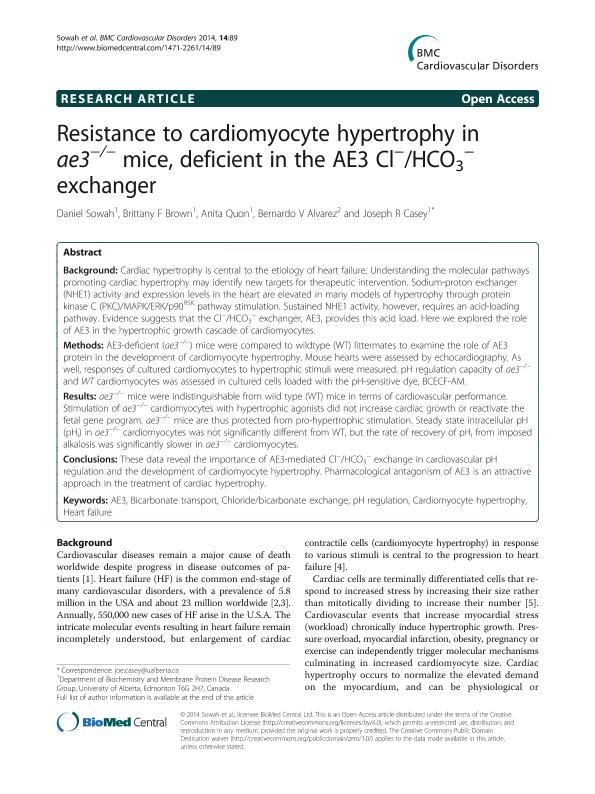Artículo
Resistance to cardiomyocyte hypertrophy in ae3−/− mice, deficient in the AE3 Cl− /HCO3 − exchanger
Fecha de publicación:
07/2014
Editorial:
Biomed Central
Revista:
Bmc Cardiovascular Disorders
ISSN:
1471-2261
Idioma:
Inglés
Tipo de recurso:
Artículo publicado
Clasificación temática:
Resumen
Background: Cardiac hypertrophy is central to the etiology of heart failure. Understanding the molecular pathways promoting cardiac hypertrophy may identify new targets for therapeutic intervention. Sodium-proton exchanger (NHE1) activity and expression levels in the heart are elevated in many models of hypertrophy through protein kinase C (PKC)/MAPK/ERK/p90RSK pathway stimulation. Sustained NHE1 activity, however, requires an acid-loading pathway. Evidence suggests that the Cl− /HCO3 − exchanger, AE3, provides this acid load. Here we explored the role of AE3 in the hypertrophic growth cascade of cardiomyocytes.
Methods: AE3-deficient (ae3−/− ) mice were compared to wildtype (WT) littermates to examine the role of AE3 protein in the development of cardiomyocyte hypertrophy. Mouse hearts were assessed by echocardiography. As well, responses of cultured cardiomyocytes to hypertrophic stimuli were measured. pH regulation capacity of ae3−/− and WT cardiomyocytes was assessed in cultured cells loaded with the pH-sensitive dye, BCECF-AM.
Results: ae3−/− mice were indistinguishable from wild type (WT) mice in terms of cardiovascular performance. Stimulation of ae3−/− cardiomyocytes with hypertrophic agonists did not increase cardiac growth or reactivate the fetal gene program. ae3−/− mice are thus protected from pro-hypertrophic stimulation. Steady state intracellular pH (pHi ) in ae3−/− cardiomyocytes was not significantly different from WT, but the rate of recovery of pHi from imposed alkalosis was significantly slower in ae3−/− cardiomyocytes.
Conclusions: These data reveal the importance of AE3-mediated Cl− /HCO3 − exchange in cardiovascular pH regulation and the development of cardiomyocyte hypertrophy. Pharmacological antagonism of AE3 is an attractive approach in the treatment of cardiac hypertrophy.
Archivos asociados
Licencia
Identificadores
Colecciones
Articulos(CIC)
Articulos de CENTRO DE INVEST.CARDIOVASCULARES (I)
Articulos de CENTRO DE INVEST.CARDIOVASCULARES (I)
Citación
Sowah, Daniel; Brown, Brittany F.; Quon, Anita; Alvarez, Bernardo; Casey, Joseph R.; Resistance to cardiomyocyte hypertrophy in ae3−/− mice, deficient in the AE3 Cl− /HCO3 − exchanger; Biomed Central; Bmc Cardiovascular Disorders; 14; 89; 7-2014; 1-16
Compartir




